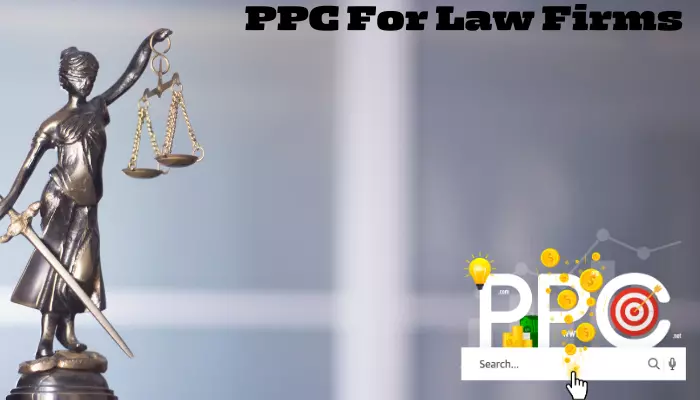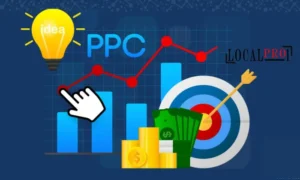Local SEO Services Near Me | Local Pro1 Welcome to...
Boosting Legal Visibility: Local Pro1’s Expertise in PPC for Law Firms
Boosting Legal Visibility: Local Pro1's Expertise in PPC for Law Firms
Businesses can publish advertisements on search engines and other online platforms using pay-per-click (PPC) advertising, which charges a fee only when the ad is clicked.PPC advertising may prove to be a useful tactic for legal firms trying to get in touch with clients in need of their services. We’ll look at what PPC means for legal firms in this review and discuss its significance for legal marketing. Localpro1 provides the best services of PPC for Law Firms as you dreamed of.

Definition of PPC for Law Firms
Pay-Per-Click (PPC) for law firms involves the use of online advertising to drive traffic to their websites.Advertising from law firms appears on search engine results pages (SERPs) and other online platforms when they bid on keywords associated with their practice areas.When a user clicks on the ad, the law firm incurs a cost.
Importance of PPC in Legal Marketing:
Targeted Advertising:PPC allows law firms to target specific keywords related to their practice areas. This precision ensures that ads are shown to individuals actively seeking legal assistance, increasing the likelihood of conversion.
Immediate Visibility:Unlike organic search engine optimization (SEO), which takes time to produce results, PPC for law firms provides immediate visibility. By ranking top in search results, law firms may instantly increase their online visibility as soon as their ads go live.
Measurable Results:PPC campaigns offer detailed analytics that allow law firms to track the performance of their ads.Cost per click (CPC), conversion rate, and click-through rate (CTR) are examples of metrics that provide useful information to organizations so they may optimize their strategies for maximum results.
Budget Control:Law firms have control over their PPC budgets, allowing them to set daily or monthly spending limits. This flexibility ensures that advertising costs align with the firm’s financial goals, and adjustments can be made based on campaign performance.
Geo-Targeting:PPC platforms often allow geo-targeting, enabling law firms to focus their ads on specific geographic locations. This is particularly beneficial for local practices aiming to attract clients in their immediate vicinity.
Explanation of PPC (Pay-Per-Click)
Pay-Per-Click is an online advertising model where advertisers, in this case, lawyers or law firms, pay a fee each time their ad is clicked. It’s a way of buying visits to a website rather than earning those visits organically. Search engine advertising is one of the most popular forms of PPC, where advertisers bid for ad placement in a search engine’s sponsored links when someone searches for a relevant keyword.
How PPC Works for Law Firms
Keyword Selection: Lawyers choose relevant keywords that potential clients might use when searching for legal services.
Ad Creation: Compelling ads are created to appear when someone searches for the selected keywords.
Bid for Ad Placement: Lawyers bid on how much they are willing to pay for a click on their ad.
Ad Placement and Visibility: When a user searches for a relevant term, the search engine’s algorithm determines which ads to display based on bids and other factors.
Key Components of PPC Campaigns for Lawyers
Keyword Research: Identifying and selecting the most relevant keywords related to legal services.
Ad Copy: Crafting compelling and informative ad text that encourages clicks.
Landing Pages: Ensuring that the pages users land on after clicking an ad are optimized for conversions and provide relevant information.
Bid Management: Strategically managing bids to maximize visibility within budget constraints.
Tracking and Analytics: Implementing tools to track the performance of PPC campaigns, such as click-through rates, conversion rates, and return on investment.
PPC vs SEO
Overview of SEO (Search Engine Optimization)
Search Engine Optimization (SEO) is a digital marketing strategy focused on improving a website’s visibility in search engine results organically. The primary goal of SEO is to enhance the quality and relevance of a website’s content so that search engines like Google rank it higher when users enter relevant queries. SEO involves various on-page and off-page optimization techniques, including keyword research, content creation, link building, and technical optimizations.
Key components of SEO include
Keyword Optimization: Researching and incorporating relevant keywords into website content to match user search queries.
Content Quality: Creating high-quality, informative, and engaging content that satisfies user intent and adds value.
Backlink Building: Acquiring quality backlinks from reputable websites to enhance the website’s authority.
Technical SEO: Optimizing the website’s structure, speed, and other technical aspects to improve its search engine performance.
User Experience: Ensuring a positive user experience through easy navigation, mobile responsiveness, and fast loading times.
Contrasting PPC and SEO for Law Firms
PPC (Pay-Per-Click):
Cost: PPC involves paying for ads that appear at the top of search engine results or on other online platforms. Advertisers pay each time a user clicks on their ad.
Speed: PPC provides quick results as ads can be set up and go live almost immediately, driving targeted traffic to the website.
Control: Advertisers have control over ad placement, budget, and targeting options, allowing for precise audience targeting.
Temporary Results: PPC results are temporary, and traffic ceases once the advertising budget is exhausted.
SEO
Cost: SEO is generally considered a long-term investment, as it takes time to see significant results. However, organic traffic doesn’t incur direct costs per click.
Time: SEO results take time to materialize, often several months, as search engines need to crawl and index the optimized content.
Control: While website owners can influence SEO through optimization efforts, they have less direct control over search engine rankings compared to PPC.
Sustainability: SEO results are more sustainable over the long term, as organic traffic continues even if optimization efforts are scaled back.
When to Use PPC and When to Use SEO in Legal Marketing
Use PPC When
Immediate Results are Needed: If you need quick visibility and traffic, PPC for law firms can provide instant results.
Targeting Specific Keywords: PPC allows precise targeting of specific keywords relevant to legal services.
Limited Time Campaigns: For short-term promotions or events, PPC can be a strategic choice.
Use SEO When
Building Long-Term Authority: For establishing a strong, long-term online presence and building trust.
Cost-Effectiveness Over Time: While the initial investment may be high, the cost per click decreases over time with SEO.
Comprehensive Online Visibility: SEO helps improve organic rankings across various search queries, providing broad visibility.
PPC Strategies for Lawyers (That Actually Work)
Certainly! Let’s dive into effective PPC (Pay-Per-Click) strategies tailored for lawyers that encompass keyword research, compelling ad copy creation, and targeted audience selection.
Keyword Research for Legal Campaigns:
Focus on Specific Legal Services:
- Identify keywords related to specific legal services your firm offers (e.g., “personal injury lawyer,” “criminal defense attorney”).
- Use long-tail keywords to capture more targeted leads (e.g., “divorce attorney for high net worth clients”).
Location-Based Keywords:
- Incorporate geographical modifiers in keywords to attract local clients (e.g., “employment lawyer Los Angeles”).
- Utilize location-specific terms to enhance relevance and increase the likelihood of conversion.
Negative Keywords:
- Implement negative keywords to filter out irrelevant traffic (e.g., “free legal advice,” “pro bono services”).
- Regularly update negative keyword lists to refine targeting and improve ad spend efficiency.
Competitor Analysis:
- Identify keywords that competitors are targeting successfully.
- Analyze their ad copies and landing pages for insights into effective strategies.
Crafting Compelling Ad Copy for Law Firms:
Highlight Unique Selling Points (USPs):
- Clearly communicate what sets your law firm apart (e.g., years of experience, successful cases, personalized service).
- Use ad extensions to showcase additional information (e.g., client testimonials, awards).
Call to Action (CTA):
- Include a strong and clear CTA to encourage user engagement (e.g., “Schedule a Free Consultation,” “Call Now for Expert Legal Advice”).
- Create a sense of urgency when appropriate (e.g., “Limited Time Offer,” “Act Now”).
Emphasize Trust and Credibility:
- Feature any relevant certifications, awards, or accreditations.
- Include trust-building elements, such as client testimonials or case success stories.
Targeting the Right Audience in Legal PPC:
Demographic Targeting:
- Utilize demographic targeting options to reach specific age groups, genders, or income brackets.
- Tailor ad content to resonate with the characteristics of your target audience.
Device and Time-of-Day Targeting:
- Analyze when your target audience is most active and adjust ad scheduling accordingly.
- Consider device targeting based on the behavior of your audience (e.g., mobile users for quick consultations).
Retargeting:
- Implement retargeting campaigns to re-engage users who have previously visited your website.
- Customize ads based on the specific pages or services users have shown interest in.
Use of Legal Jargon:
- Consider using legal terms and language in ad copy to appeal to users actively seeking legal assistance.
Benefits of PPC for Law Firms
Increased Visibility in Search Engine Results:
One of the primary benefits of Pay-Per-Click (PPC) advertising for law firms is the increased visibility in search engine results.Law companies can make sure that their services are prominently shown when potential clients search for legal assistance by posting advertising strategically for relevant keywords. Greater exposure to the intended audience and higher click-through rates may result from this enhanced visibility.
Immediate Traffic and Lead Generation:
PPC campaigns offer law firms the advantage of immediate traffic and lead generation. Unlike organic search engine optimization (SEO) efforts, which take time to show results, PPC allows law firms to place ads and start generating traffic to their website almost instantly. When a law firm want to take advantage of particular events or trends, or when there is a deadline on a legal matter, this rapid turnaround is especially helpful.
Successful Implementation of PPC for Law Firms:
These case studies might draw attention to particular difficulties experienced by legal companies, PPC campaign tactics, and quantifiable results attained. Examples from the real world can act as standards for other legal firms wishing to integrate or enhance their PPC campaigns.
Conclusion
Pay-Per-Click (PPC) advertising stands as a potent tool for law firms aiming to expand their online reach, engage potential clients, and elevate their digital presence. Through targeted campaigns, meticulous keyword selection, and strategic ad placements, PPC offers an avenue to connect with individuals seeking legal services in a competitive digital landscape. Feel free to contact us for any type of query or the services related to PPC for Law firms.
FAQs
What Is PPc, And How Does It Apply To Law Firms?
PPC, or Pay-Per-Click, is an online advertising model where advertisers pay a fee each time their ad is clicked. In the context of law firms, PPC involves placing ads on search engines to attract potential clients actively searching for legal services.
How Can PPc Benefit Law Firms In Their Marketing Efforts?
PPC provides law firms with targeted visibility on search engine results pages, ensuring their ads are seen by individuals actively seeking legal assistance. It offers a quick and measurable way to generate leads, increase website traffic, and enhance the online presence of a law practice.
What Platforms Are Commonly Used For PPc Advertising In The Legal Industry?
Google Ads is the most popular platform for PPC advertising among law firms. Bing Ads is another option. Both platforms allow firms to create highly targeted ads and reach potential clients based on specific keywords and demographics.
How Do Law Firms Choose The Right Keywords For Their Ppc Campaigns?
Keyword selection involves identifying terms and phrases potential clients might use when searching for legal services. Firms often conduct thorough keyword research, considering the relevance, competition, and search volume of each keyword to ensure their PPC campaigns are effective.
What Are The Key Metrics To Monitor In A PPc Campaign For A Law Firm?
Important metrics include click-through rate (CTR), conversion rate, cost per click (CPC), and return on investment (ROI). Monitoring these metrics allows law firms to assess the performance of their PPC campaigns and make data-driven adjustments for better results.
Our Services
Our Latest Posts
PPC White Label Services by Local Pro1 | Expert Solutions
PPC White Label Services by Local Pro1 | Expert Solutions...



